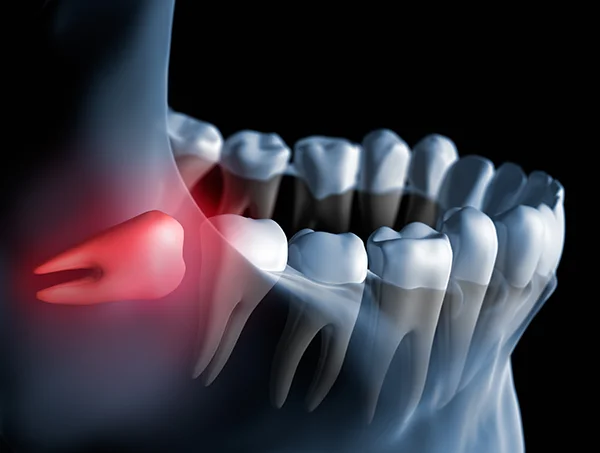Things to Understand About Your Wisdom Teeth
Posted on 10/15/2024 by Young Jun DDS MD FACS |
 Wisdom teeth are the last teeth to erupt in the mouth, typically between the ages of 17 and 25. They are located at the back of the mouth, two on the top and two on the bottom. While some people have healthy wisdom teeth that erupt without causing any problems, others experience complications that require their removal. Here's what you need to know about wisdom teeth: Wisdom teeth are the last teeth to erupt in the mouth, typically between the ages of 17 and 25. They are located at the back of the mouth, two on the top and two on the bottom. While some people have healthy wisdom teeth that erupt without causing any problems, others experience complications that require their removal. Here's what you need to know about wisdom teeth:
Why Do We Have Wisdom Teeth?
Our ancestors likely needed wisdom teeth for chewing tough, fibrous foods. However, modern diets are much softer, and wisdom teeth often don't have enough space to erupt properly. This can lead to impaction, where the tooth remains trapped beneath the gums or bone, or partial eruption, where only a portion of the tooth emerges.
Potential Problems with Wisdom Teeth
Impacted or partially erupted wisdom teeth can cause several problems, including:
| • |
Pain and swelling: The pressure from the impacted tooth can cause pain and swelling in the jaw and gums. |
| • |
Infection: Food and bacteria can become trapped around the partially erupted tooth, leading to infection. |
| • |
Damage to nearby teeth: The impacted tooth can push against neighboring teeth, causing damage or misalignment. |
| • |
Cyst formation: A fluid-filled sac can develop around the impacted tooth, damaging the surrounding bone. |
When Wisdom Teeth Need to be Removed
Not all wisdom teeth require removal. However, if you experience any of the problems mentioned above, or if your dentist determines that your wisdom teeth are at risk of causing problems in the future, removal is usually recommended.
The Wisdom Teeth Removal Procedure
Wisdom teeth removal is a common surgical procedure performed by oral surgeons. The procedure typically involves the following steps:
| • |
Local anesthesia: The area around the tooth is numbed with a local anesthetic. |
| • |
Removal of the tooth: The surgeon makes an incision in the gum tissue and removes the tooth, either in one piece or in sections. |
| • |
Stitches: The incision is closed with stitches, which will dissolve on their own in a few days. |
Recovery After Wisdom Teeth Removal
After wisdom teeth removal, you can expect some swelling and discomfort. Your oral surgeon will provide you with instructions on how to manage your pain and discomfort, including taking pain medication and applying ice packs. It's important to follow these instructions carefully to ensure a smooth recovery.
Wisdom Teeth and Oral Care
Even if you have your wisdom teeth removed, it's important to maintain good oral hygiene habits, including brushing twice a day, flossing daily, and seeing your dentist for regular checkups. This will help to prevent problems with your remaining teeth and gums.
Restoration Dentistry After Wisdom Teeth Removal
In some cases, wisdom teeth removal can leave gaps in your smile. If this is a concern for you, your dentist can discuss restoration dentistry options, such as dental implants or bridges, to replace the missing teeth and restore the function and appearance of your smile.
Wisdom teeth can be a source of problems for many people. If you have any concerns about your wisdom teeth, talk to your dentist. They can assess your individual situation and advise you on the best course of action. By understanding the potential problems associated with wisdom teeth and the importance of good oral care, you can make informed decisions about your dental health.
|
|